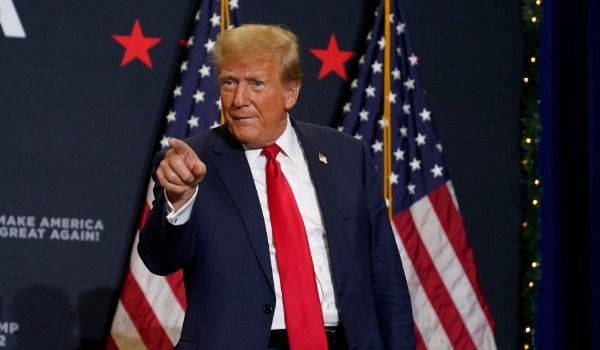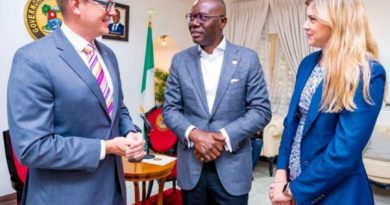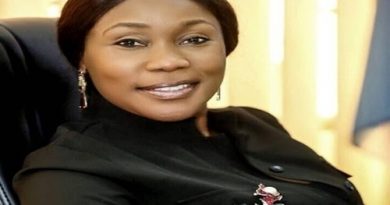WHO Succeeds Lawan: Historical antecedent favours South-South shot at leadership of 10th Senate
Providence position Godswill Akpabio on more ground in race for Senate President
Nigeria adopted the federal presidential constitution in the second republic in 1979 which birth the bicameral legislative political structure comprising the Senate and House of Representatives.
Joe Wayas became the first Senate President and served a single full term before the Shehu Shagari led NPN government under which the national assembly thrived was truncated by the Armed Forces in the ill-fated December 31st, 1983 coup d’ etat.
A chronicle of the turnover of Senate Presidents who doubles as head of the federal legislature by region from 1979 till 2023 profiles 10 Senators as former and present occupants of the office.
The South-South region had the first and only shot spanning 1979 -1983 through the representation of Senator Joe Wayas from Cross River State.
Thereafter, a long and enduring period of 18 years unbroken military rule though disrupted by the short-lived three months Interim National Government of Chief Earnest Shonekan, put on hold democratic governance till May 1999 when the fourth republic led by Olusegun Obasanjo, a former military head of state boarded.
The South West and North East where the President-elect and his vice hails on a Muslim/Muslim ticket are out of the equation. The later is further relegated by reason of the present occupant, Ahmed Lawan coming from the region. In the case of the North West and North Central, the incumbent, President Muhammadu Buhari who after May 29 will be addressed as the immediate past president is from the former while two Senators, David Mark and Olushola Saraki had occupied the position at different periods and hails from the later. Mark had a two term concurrent stint between 2005 and 2015. Saraki is the immediate past Senate President who served a single term 2015 to 2019.
Unarguably, the South East region is the most decorated occupant of the office since inception of the fourth republic, posting the highest turnover of 5 Presidents of the Senate. The zone has led the upper legislative chamber at different times concurrently from 1999 to 2007.
Specifically, in my orchestrated jumbo 5×125 relay race, Senator Evan Enwerem took the first hit serving as Senate President in 1999. Senator Chuba Okadigbo ran the second hit as Senate President between 1999 and 2000. Senator Anyim Pius Anyim was next in line leading the red chamber from 2000 to 2023. Senator Adolphus Wabara took the baton and reigned as President of the Senate between 2003 and 2005. Senator Ken Nnamani completed the final lap as Senate President from the region reigning from 2005 to 2007.
The outlook of the Senate in the 10th National Assembly is unique because of the diverse and more inclusive composition of the new upper chamber. Unlike in previous congregations where three political parties as in the case of 1999 had footprints and disproportionately composed with one of the parties dominating overwhelmingly, the yet to be constituted hallow chamber draw senators-elect from the All Progressives Congress (59); Peoples Democratic Party (36); Labour Party (8); New Nigeria Peoples Party (2); Social Democratic Party (2); All Progressive Grand Alliance (1) and Young Progressive Party (1).
The diversity this time around is intense and roburst as reflected for instance in Abia State where the All Progressives Congress APC, Labour Party LP and All Progressive Grand Alliance APGA all picked seats from north, central and south senatorial zones respectively in the February 25 Presidential and National Assembly elections.
The overwhelming majority of 59 senate slots garnered by the ruling APC has positioned the party to produce the Senate President in the 10th Senate after inauguration on June 13, 2023.
Already, there is substantial anxiety and unease in the ranks of the 10 APC senators and their supporters that have indicated interest to contest the position of president in the 10th senate.
As the race for the senate top job hots up with passionate opinions from contenders to justify their eligibility, the roll call of gladiators that have indicated interest is climbing and include in the time being, Oji Uzo Kalu, Senate Chief Whip, David Umahi, the Ebonyi State governor, Jibril Barau, the Senator representing Kano Central Senatorial district and chairman Senate Committee on appropriation, Senator Godswill Akpabio, the former governor of Akwa Ibom state, Adams Oshiomhole, former National Chairman of the All Progressives Congress, Sani Musa, Abdulaziz Yari, former Zamfara governor, Osita Izunaso, Ali Ndume and Ahad Lawan, the outgoing Senate President.
The seemingly dominant narrative around competence and experience often flaunted by aspirants hold near zero substance in this instance as the 10 candidates, save few with no legislative background, are ranking members of the senate.
Others in the race that are not ranking members stand no chance unless the othordox senate rule book is changed and the threshold manipulated. We hear though that plot is thickening to amend the Senate Rules that will allow the first-term senators to run for principal positions.
Part of the pushback put forward by first-timers is that the Nigerian constitution states in sec. 50 sub sec. 1 that members of the National Assembly should elect its principal members. Other contestants that perceive marginalization argue that regions that gave the president- elect the highest number of votes should be supported to pick the converted slot.
However, a clear pattern of the region and the likely individual the lot may fall on to assume the office of Senate President is gradually unraveling given the ongoing momentum and horse-trading within the ruling party.
The South-South geo-political region leveraging on the dynamics of identity politics driven by religion, ethnicity, geo-political location and other pecuniary factors have the edge over other zones to clinch the number one position in the 10th senate having had a shot 40 years ago in the second republic.
Daily Trust newspapers reported recently that the president-elect Bola Ahmed Tinubu has concluded plans to pair the former governor of Akwa Ibom State, Senator Godswill Akpabio, with Senator Jibrin Barau as Senate president and deputy respectively.
The national tabloid quoted a source as revealing that the president-elect communicated his decision to Akpabio and Barau during a meeting in Abuja where Barau was asked to drop his bid for the Senate presidency in the interest of national cohesion, fairness and religious balancing.
The story is an unfolding lead even as APC said it is yet to zone the 10th National Assembly leadership positions contrary to reports in some sections of the media.
The choice of Godswill Akpabio in my reckoning, would be a strategically appropriate action for the ruling party not only to assuage the diverse interest within and without the APC fold but as well to appeal to Senators-Elect from the other 7 political parties that have footprints in the 10th senate. This dynamics of center and periphery balancing is critical to douse tension and generate harmony which is vital in stabilizing the 10th assembly.
But interrogating Tinubu’s endorsement which is already in public domain to ascertain its value and capacity to disrupt voting pattern on the floor of the hallow chamber in his favour remains a tricky forecast.
However, I do think going by antecedent of endorsements by high-profile politicians in Nigeria’s political space, Tinubu’s bias confers substantial validation expected to give Akpabio leverage in the senate president race.
Already, out of the seven senators that emerged on the APC ticket from the South-South, only Akpabio is a ranking member and a principal officer in the 8th senate spanning 2015 to 2019. Others are first timers who would ordinarily provide support to energize his campaign base thus positioning him appropriately to win.
But one final trump card that is key and sufficiently lethal to impact the pattern of voting on the senate floor is intense lobbying backed with monitory inducement. This element would play substantial role especially given the rift and seeming discordant voices on consensus candidacy. Senators in the race with deep pockets and willingness to pay premium stand a better chance of winning. Akpabio, like the gambler portrayed in the sound track of Kenny Rogers knows when to turn the table and strike the kill.
As a plus, Senator Godswill Akpabio will leverage on the long period of hibernation of the region, his knack in connecting with people as well as negotiating power especially at the top which aptly earned him the appellation “iweg Akwa Ibom.” His very recent visit to President Muhammadu Buhari to inform him of his intent to be senate president and thank him for giving him the opportunity to serve in his government attest to his networking capacity.
Aggregation of these efforts and developments, elevated by providence would substantially position Akpabio ahead of his contemporaries in the race for the top legislative job.




